外研高一必修3 Module 3 The Violence of Nature模块复习课件(76张)
文档属性
| 名称 | 外研高一必修3 Module 3 The Violence of Nature模块复习课件(76张) | 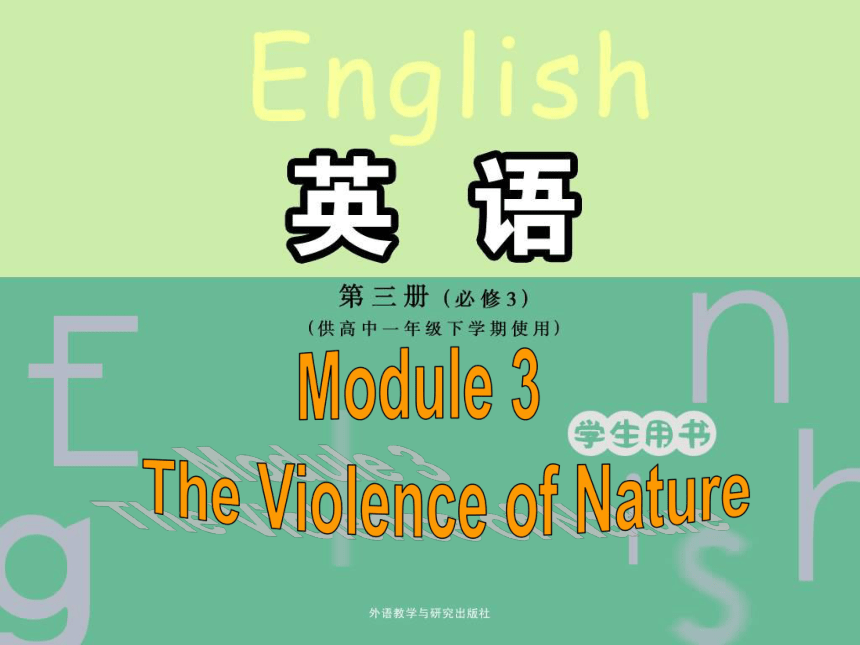 | |
| 格式 | zip | ||
| 文件大小 | 292.7KB | ||
| 资源类型 | 教案 | ||
| 版本资源 | 外研版 | ||
| 科目 | 英语 | ||
| 更新时间 | 2017-01-18 20:11:39 | ||
图片预览

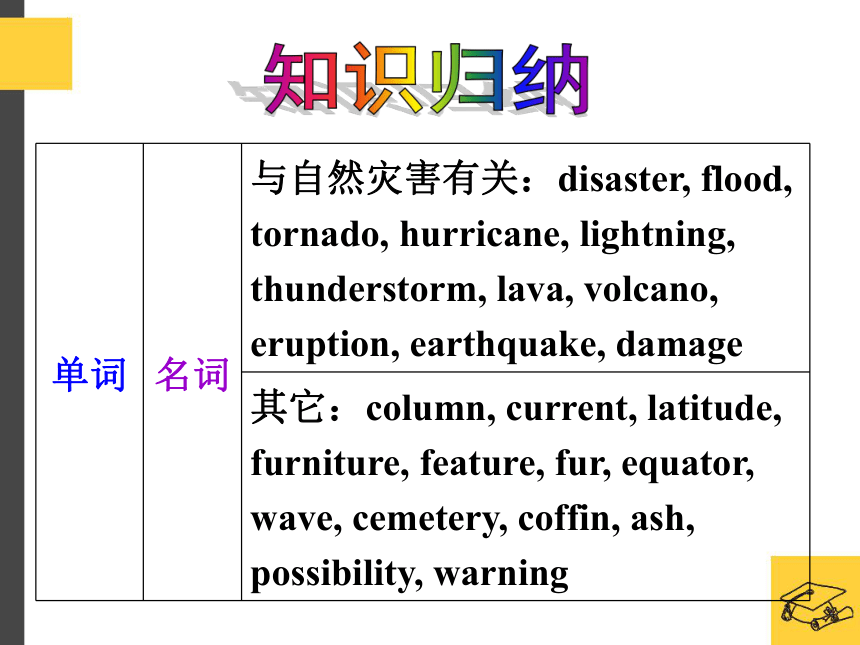
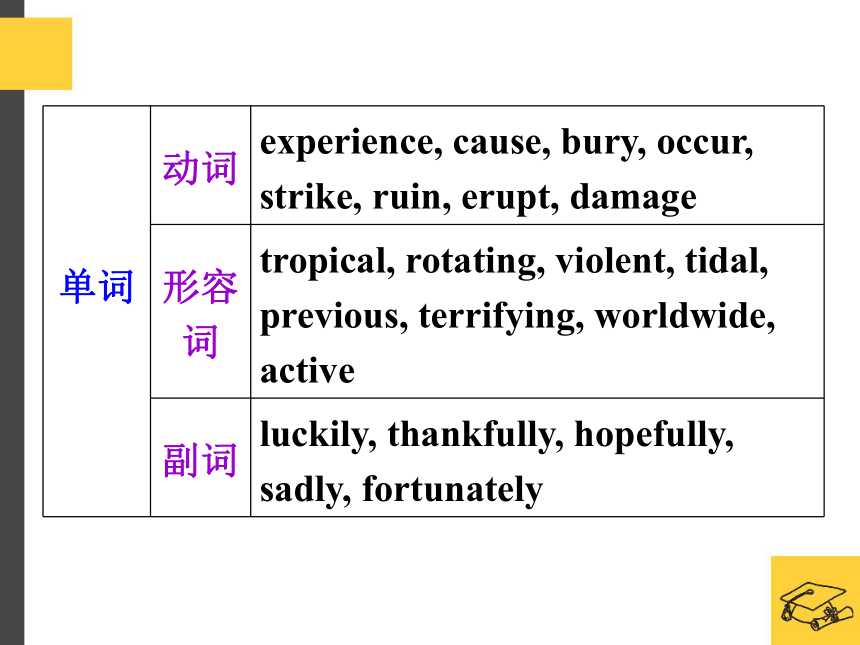
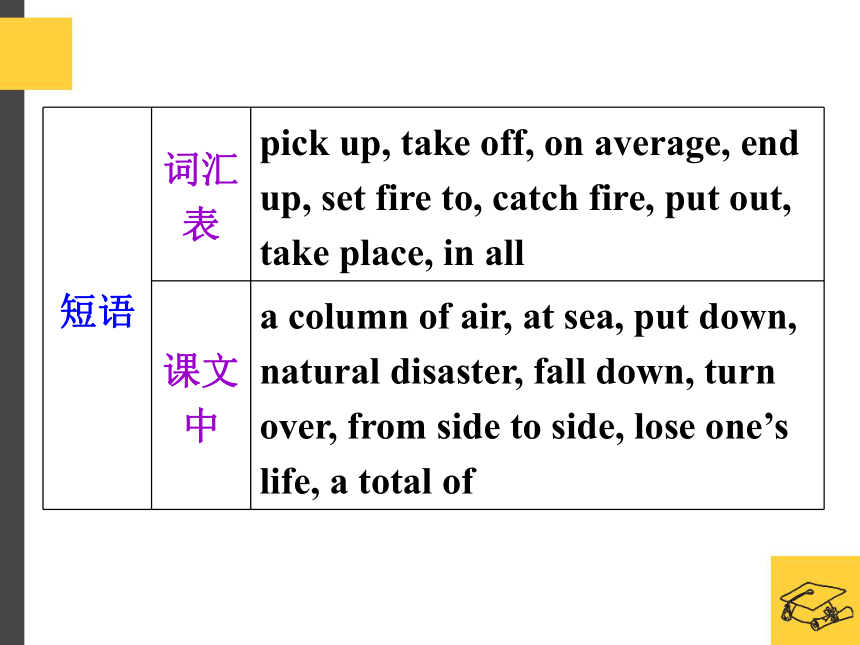
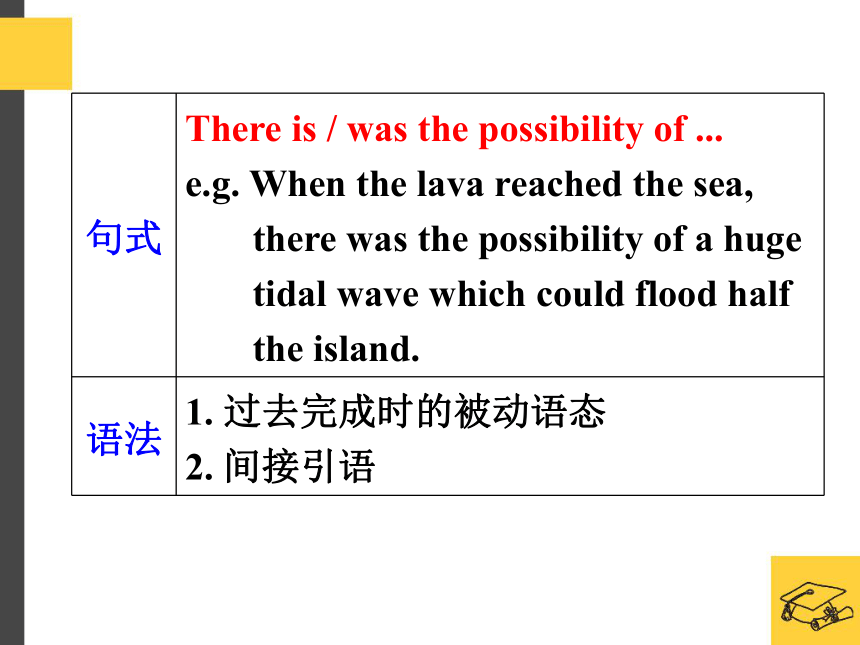
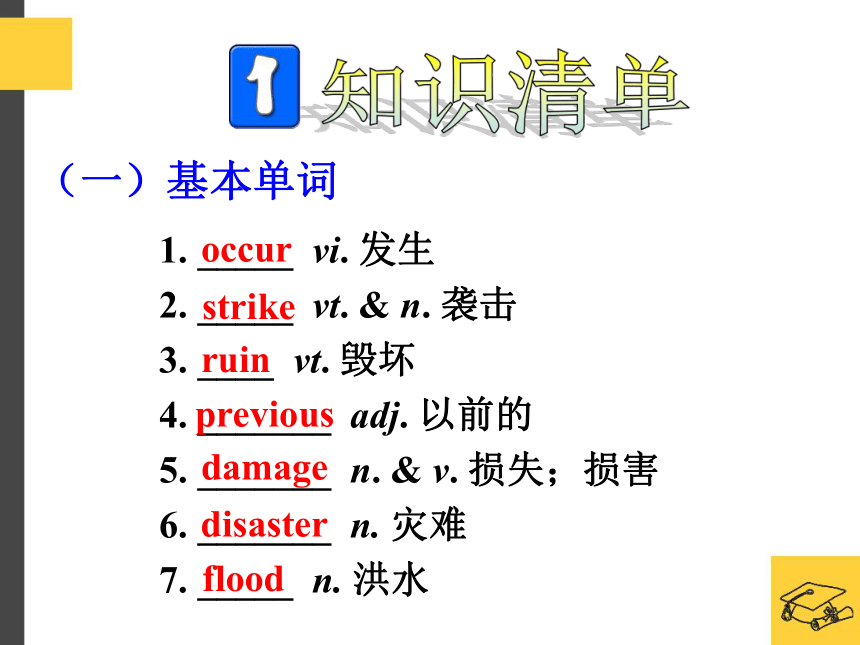
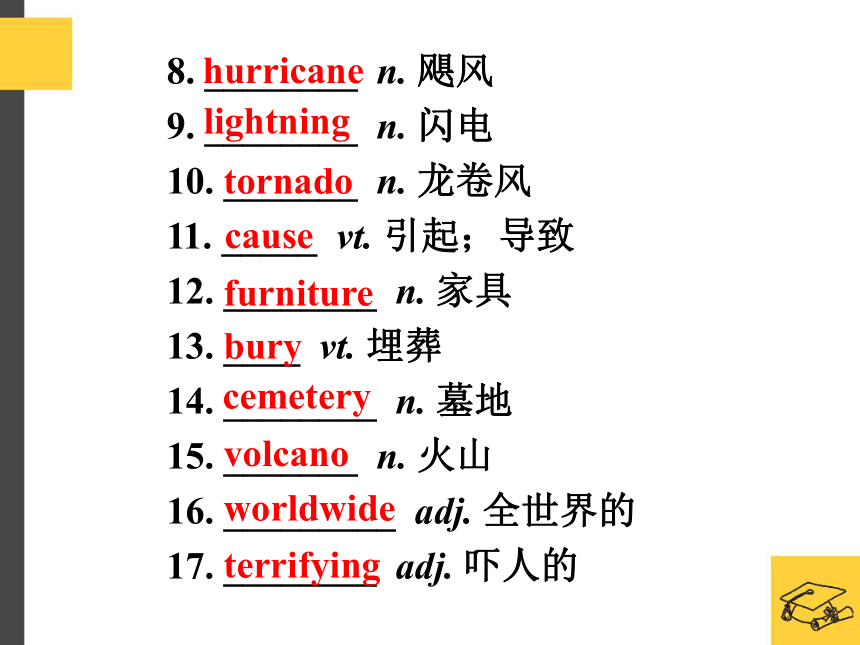
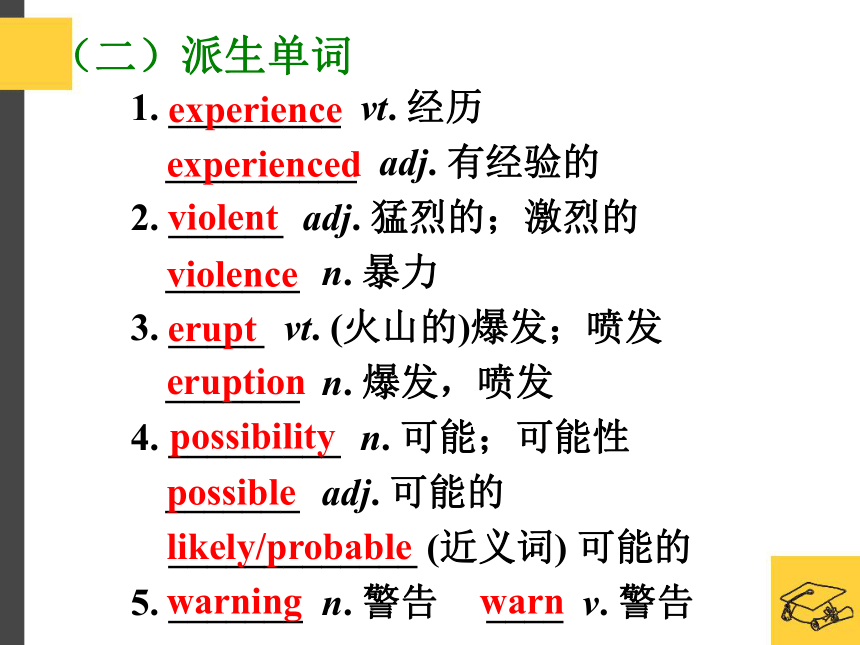
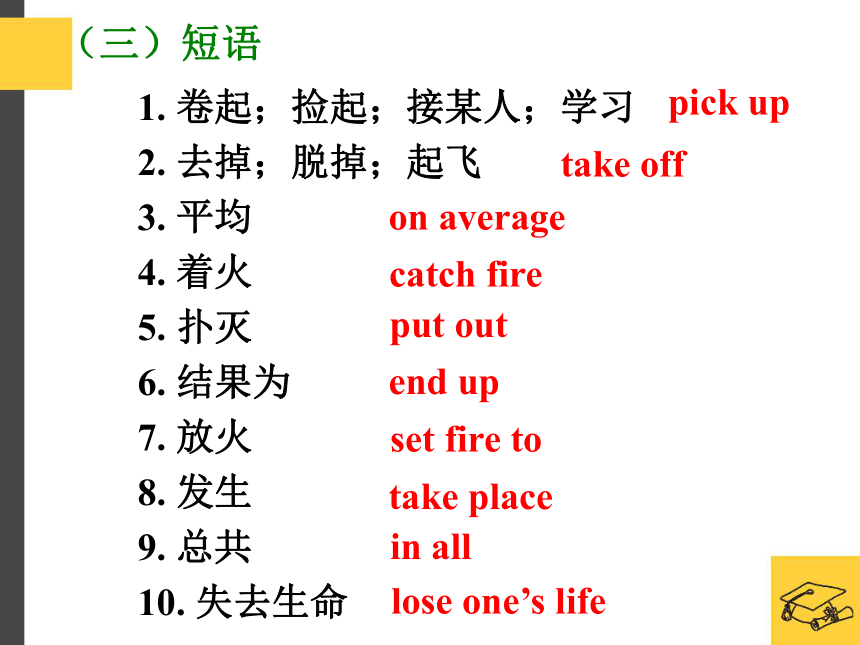
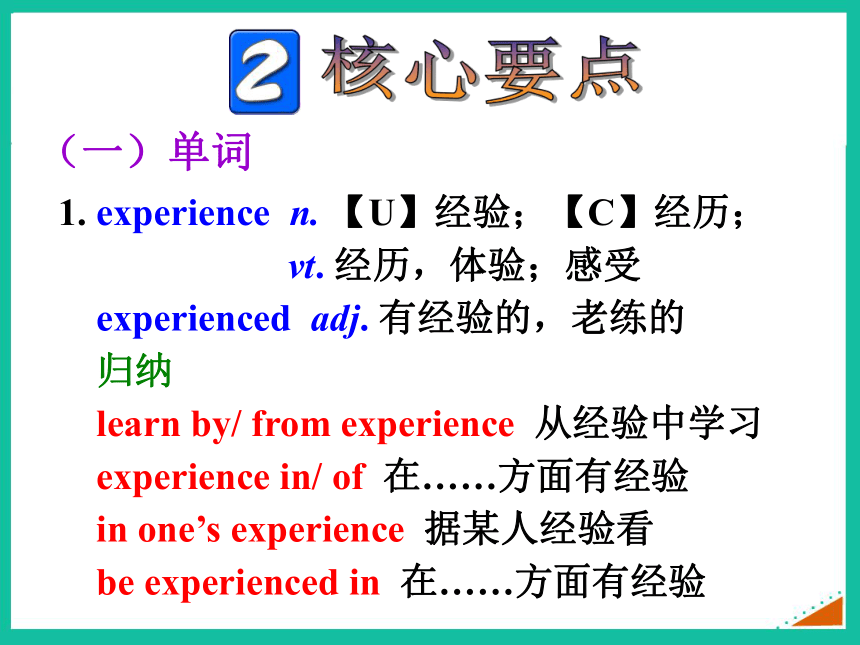
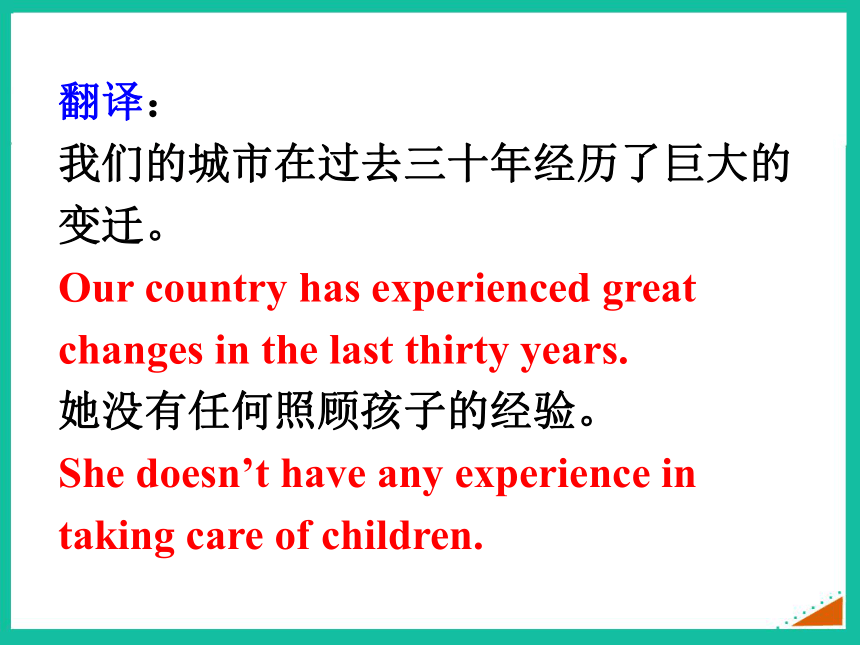

文档简介
课件76张PPT。Module 3
The Violence of Nature 知识归纳1. _____ vi. 发生
2. _____ vt. & n. 袭击
3. ____ vt. 毁坏
4. _______ adj. 以前的
5. _______ n. & v. 损失;损害
6. _______ n. 灾难
7. _____ n. 洪水知识清单(一)基本单词occurstrikeruinpreviousdamagedisasterflood8. ________ n. 飓风
9. ________ n. 闪电
10. _______ n. 龙卷风
11. _____ vt. 引起;导致
12. ________ n. 家具
13. ____ vt. 埋葬
14. ________ n. 墓地
15. _______ n. 火山
16. _________ adj. 全世界的
17. ________ adj. 吓人的hurricanelightningtornadocausefurnitureburycemeteryvolcanoworldwideterrifying1. _________ vt. 经历
__________ adj. 有经验的
2. ______ adj. 猛烈的;激烈的
_______ n. 暴力
3. _____ vt. (火山的)爆发;喷发
_______ n. 爆发,喷发
4. _________ n. 可能;可能性
_______ adj. 可能的
_____________ (近义词) 可能的
5. _______ n. 警告 ____ v. 警告experienceexperiencedviolentviolenceerupteruptionpossibilitypossiblelikely/probablewarningwarn(二)派生单词1. 卷起;捡起;接某人;学习
2. 去掉;脱掉;起飞
3. 平均
4. 着火
5. 扑灭
6. 结果为
7. 放火
8. 发生
9. 总共
10. 失去生命pick up take offon averagecatch fireput outend upset fire totake placein alllose one’s life(三)短语1. experience n. 【U】经验;【C】经历;
vt. 经历,体验;感受
experienced adj. 有经验的,老练的
归纳
learn by/ from experience 从经验中学习
experience in/ of 在……方面有经验
in one’s experience 据某人经验看
be experienced in 在……方面有经验核心要点(一)单词翻译:
我们的城市在过去三十年经历了巨大的变迁。
Our country has experienced great changes in the last thirty years.
她没有任何照顾孩子的经验。
She doesn’t have any experience in taking care of children.2. bury vt. 埋葬,用某物覆盖;
从 记忆中除去,忘记
归纳
bury sb. in/at sth. 将某人埋葬在……
bury sth. under/ beneath sth.
将……埋在……下面
bury one’s face in hands 用手捂住脸
bury oneself in work/ studies
埋头工作/ 学习3. occur vi. 发生,出现;
(想法、念头等)浮现,想起
归纳
If anything should occur ...
如果发生什么事情的话……
It occurred to sb. that ...
某人刚刚想到……
sth. occurs to sb. 某事浮现在某人的脑海
中;某人想到……翻译下列句子。
村子里发生了奇怪的事。
Something strange occurred in the village.
她突然想到艾米害怕独处。
It suddenly occurred to her that Amy was afraid of being alone.辨析?happen, occur, take place
三者都可表示“发生”。
happen 表示“发生”时,主语一般为事;主语为人时,为“碰巧”。
occur 表示“偶然发生”时可与happen互换,还可表示“按计划发生”。
当happen与occur后接to sb. 时含义不同:happen to sb. 多指不好的事情发生在某人身上;occur to sb. 指某事、想法、观念等出现在某人的头脑中。
take place?计划、安排之内的“发生,进行”,偶尔也可表示计划之外的“发生”,但其后面一般不接to sb. / sth. 结构。4. strike (struck; struck/ stricken) vt. 打;(灾难、暴风雨等)袭击;侵袭;使突然发生;
给……以印象;(钟)敲响;划(火柴); 打动某人的心(常用被动);感动
vt.& vi. 碰撞;突然想到 n. 罢工
归纳
strike sb. + in/on the+ 身体部位 打某人某处
be struck by/ on/ with...
被……打动,迷恋……
It strikes sb. that / how ... 某人突然想到……
be on strike 在罢工根据汉语意思完成下列句子。
1. 老师进来的时候,学生们在敲打课桌。
The students ________________________ when the teacher came in.
2. 没过多久这个地方再次遭受了洪水的袭击。
It was not long before ____________ _______________ again.
3. 打动我的是他们学英语的热情。
_________________ was their enthusiasm for learning English.?were striking their desks?? this area wasWhat struck mestruck by a flood??? 5. ruin vt. 毁坏,使破产 n. 毁坏; 垮台;
(pl.)废墟; 遗迹
归纳
ruin oneself 毁掉自己
in ruins 成为废墟
be the ruin of
成为……毁灭/堕落的原因
bring... to ruin 使……毁灭;使……没落
go to/ fall to/ come to ruin
毁灭,灭亡;崩溃;破坏掉根据括号内所给的汉语提示补全下列句子。
1. Years of fighting have left the area _________ (破败不堪).
2. That fire ________________________ (毁灭了整个村庄), but the people there rebuilt it.in ruins ?ruined the whole village6. cause v.?引起,导致?
n.?起因;理由;事业
cause sb./ sth. to do sth. 导致某人做某事
辨析?cause, reason
cause “(造成某事的直接)原因”
e.g. What was the cause of these
misunderstandings?
reason “(做某事的)理由”
e.g. He has given no reasons for his
decision. 1. pick up 拾起,捡起;(无意中)学会;收到;整理;接某人;恢复(健康)
拓展
pick on 选择;针对;挑中(某人)(作挨骂或受罚对象)
pick out 选出;认出
pick off 摘去,去除(二)短语写出下列句子中画线部分的中文释义。
1. I picked up the flu while I was in America. _____________
2. Diana soon picked up French when she went to live in France.????? _______________
3. We're waiting until the weather picks up a bit. _____________
4. He picked up the pencil and gave it to me.????? ________
5. At the next corner the bus stopped and picked up three people.??_________________染上(疾病)(无意中)学会???好转,改善拾起??(用车辆等)搭载2. end up in 以……结束,以……告终
拓展
end (up) in failure/victory/a draw 以失败/胜利/平局结束(在某种结果中结束,用in)
end (up) with good wishes 以美好的祝愿结尾(多指以某种方式结束)
end up 结果为……,以……结束(意料之外)put an end to 使……终止
come to an end 到头了,结束了
by the end of 到……结束时
bring… to an end 使终止
on end 连续地3. in all 总共,总计
拓展
above all 首先,最重要的是
after all 毕竟,终究
at all 肯定句、疑问句中意思为“竟然,终于”;
否定句中意思为“一点儿也不,根本不”;
在if引导的条件句中,意思为“既然”。
first of all 首先,最先4. on average 平均
拓展
on (an/the) average
平均,按平均数计算;一般地说
below/above (the) average
在平均水平以下/以上
up to (the) average 达到平均
the average of... ……的平均数用括号内所给单词的适当形式填空。
1. The tower of the church was ______
(strike) by lightning.
2. It was the first time that he had
__________ (experience) the sense of
beauty.Exercisesstruck experienced?? 3. Lily said that Lucy poured water all
over her painting and ______ (ruin)
it.
4. Water flooded the ship in 10 minutes,
_______ (cause) it to sink.ruined causing 用方框内合适的短语及其适当形式填空。
1. I _________ the telephone and asked for the number of the estate office.
2. The intense heat ________ most of the paint ________.
3. Women make __________ only two-thirds of what men earn.take off, pick up, on average, in all, take place, end uppicked up ?tookoff?on average4. If you drive your car like that, you will ________ in hospital.
5. The accident ___________ only a block from his home.
6. I visited, ________, ten hospitals in China.take off, pick up, on average, in all, take place, end upend up?took place?in all1. On average, there are 800 tornadoes in the US each year, causing about 80 deaths and 1,500 injuries.
美国每年平均会发生800多次龙卷风,造成大约80多人死亡,1500人受伤。
句中的现在分词短语作状语,表示结果。(三)句式分词作状语,其逻辑主语就是句子的主语。逻辑主语与分词是主动关系时,用现在分词;是被动关系时,用过去分词。
现在分词短语作状语,还可表示时间、条件、原因、伴随等。
e.g. He went out, shutting the door behind
him. 他出去后将门随手关上。
He died, leaving his wife with five
children.
他死了,留下他妻子和五个孩子。2. Montserrat is a beautiful small island in the Caribbean, only 16 kilometers long and 10 kilometers wide.
蒙塞拉特岛是加勒比海上的一个美丽的小岛,仅长16千米,宽10千米。
表示长、宽、深、高、厚、年龄等的句型:
1) 主语+be+数词+单位词复数+形容词
(long/ wide/ high/ tall/ thick/ deep/ old等)2) 主语+be+数词+单位词复数+in+名词
(length/ width/ height/ depth/ age等)
3) This is a+数词+单位词单数+形容词+名词
e.g. The bridge is 200 meters long.
=The bridge is 200 meters in length.
这座桥长200米。
This is a 200-metre-long bridge.
这是一个长200米的桥。3. They can destroy houses, but leave the furniture inside exactly where it was.
它们能破坏房子,而把房内的家具完全留在原处。
leave 使……处于(某种状态/位置/地步)
e.g. The teacher left little Tom standing
all the time.
老师让小汤姆一直站着。leave 听任其在某处;使保持某状态
常用于一些复合结构中,leave+宾语+形容词/副词/分词/不定式等。
leave ... alone 不理会;不管
e.g. The trial left a lot of questions
unanswered. 试验留下了许多没有得到
解答的问题。
Leave the radio on, will you?
开着收音机,好吗?Leave him to do it himself.
让他自个儿去做这件事吧。
I’ll just leave the engine running while I go to the next door.
我去隔壁的时候,会让发动机继续运行。
Paying for the repairs left him without a cent.
付了修理费后,他已身无分文。
Frankly, her rudeness left me speechless.
坦率地讲,她的粗鲁使我无话可说。语法过去完成时的被动语态?????过去完成时的被动语态形式:
had + been +及物动词的过去分词
e.g. The injured passengers had been sent to hospital before the reporters arrived at the spot. 间接引语引述某人的话可采用两种形式:一种是直接引语,即原封不动地引用原话,将其放在引号内;另一种是间接引语,即用自己的话加以转述,被转述的内容不放在引号内。直接引语是陈述句,变为间接引语时,在多数情况下都构成一个由that引导的宾语从句,引述动词通常用ask, tell等;如果直接引语讲的是客观事实或真理,变为间接引语时,时态不变。如:
The teacher said to us, “Light travels faster than sound.”
→The teacher told us that light travels faster than sound.直接引语是一般疑问句,变为间接引语时,常将其变为由连词whether或if引导的宾语从句,其主句谓语动词常用ask, wonder, want to know等。如:
Mother asked me, “Have you finished your homework?”
→Mother asked me whether / if I had finished my homework.直接引语是选择疑问句,变为间接引语时,常将其变为由whether ... or引导的宾语从句。如:
“Are you going to Beijing or Shanghai for the holidays?” she asked.
→She asked me whether I was going to Beijing or Shanghai for the holidays.直接引语是反意疑问句,变为间接引语时,常将其变为由连词whether或if引导的宾语从句。如:
“You don’t like rock music, do you?” he said.
→He asked me whether / if I liked rock music.直接引语是特殊疑问句,变为间接引语时,常将其变成由连接代词或连接副词引导的宾语从句。如:
“How many sleeping pills have you taken?” asked the nurse.
→The nurse asked me how many sleeping pills I had taken.有些表示请求、劝告、建议等意义的疑问句变为间接引语时,可用“suggest + doing”或“ask / advise +宾语+动词不定式”表示。如:
“What about starting early tomorrow morning?” Jack said.
→Jack suggested starting early tomorrow morning.“Why don’t you take the rest of the day off?” asked my assistant.
→My assistant advised me to take the rest of the day off.一、时态变化
如果主句的谓语动词是一般过去时,直接引语变为间接引语时,从句的谓语动词在时态方面要做相应的变化(如主句的谓语动词是现在时,从句的时态无须变化)。二、人称变化
可以根据口诀“一随主、二随宾、第三人称不更新”来记忆。
★“一随主”就是把直接引语中第一人称变为与主句的主语相一致的人称。
★“二随宾”就是把直接引语中第二人称变为和间接宾语(即听话人)相一致的人称。
★“第三人称不更新”就是直接引语中第三人称变为间接宾语时,人称不变。三、指示代词、时间状语、地点状语和动词的变化
直接引语变为间接引语时,指示代词、时间状语、地点状语和某些动词通常要相应变
化。
this -- that ;these -- those;now -- then ;tonight -- that night ;tomorrow -- the next / following day;yesterday -- the day before;here -- there;come -- go。注意:以上这些变化要根据实际情况而定,决不能机械照搬。如果就在当天转述,yesterday, tomorrow等时间状语不必改变;如果就在当地转述,here不必变为there。
四、语序变化
直接引语如果是疑问句,变为间接引语时,要把疑问句语序变为陈述句语序。将下列直接引语变为间接引语。
1. The shop assistant asked me, “Do you like the red or the yellow dress?”
2. My mother asked me, “You have finished your homework, haven’t you?”The shop assistant asked me if / whether I liked the red or the yellow dress.My mother asked me if / whether I had finished my homework.3. Dick asked, “How much did you pay for the bike?”Dick asked me how much I had paid for the bike.如何用英语描写自然灾害
【写作任务】
假设你是校英语报的小记者,请根据所给提
示信息,写一篇有关云南鲁甸地震的英文报
道。写作时间2014年8月3日16:30地点云南鲁甸震级6.5
损失截至8月8日,617人死亡,3000多人受
伤,112人失踪,80000多间房屋倒塌。救灾
措施1. 部队赶往灾区参加救援;2. 救灾物资
迅速运往灾区;3. 多数伤者转移至安全地
区。注意:1. 词数100左右;2. 不要逐条翻
译,可适当增加细节,以使行文连贯。
______________________________
______________________________【写作指导】
1. 审题定调:
关于自然灾害的报道,内容应该包括时间、地点、事件及其它情况。第一句话常常是导语,是对整个报道的高度概括。
2. 确定主体内容:
全文可分为三部分:
第一部分:介绍时间、地点、事件。
第二部分:介绍地震造成的损失情况。
第三部分:介绍救援情况。
3. 确定人称、时态:
人称用第三人称,时态以一般过去时为主。4. 常用表达:
the number of missing people
thousands of soldiers
food, clothes and other supplies
the majority of the injured
A terrible / violent earthquake took place / happened / occurred in ...
A big earthquake struck / hit ...
It caused ... deaths and injuries.By ..., ... people had been reported killed / injured.
... causing great damage to ...
... caused a great loss of ...
The number of ... had reached up to ...
... houses / buildings had been ruined.【参考范文】
A terrible earthquake struck Ludian in Yunnan at 16:30, August 3,2014, causing many deaths and injuries. By August 8, up to 617 people had been reported killed, and over 3,000 others injured. The number of missing people had reached up to 112. More than 80,000 houses had been ruined.Thousands of soldiers were sent to the region immediately after the earthquake occurred, to save people buried in the ruins. Food, clothes and other supplies were dropped there from helicopters as soon as possible to help the homeless. Most of the injured have been transported to safe areas. 将下列直接引语转化为间接引语。
1. The teacher said to us, “Light travels faster than sound.”
→The teacher told us _________________________________.巩固练习that light travels faster than sound2. Mother asked me, “Have you finished your homework?”
→Mother asked me _______________
________________________.
3. “Are you going to Beijing or Shanghai for the holidays?” she asked.
→She asked me ____________________
__________________________________.whether / if I hadwhether I was going tofinished my homework Beijing or Shanghai for the holidays用括号内(短语)动词的正确形式填空。
1. The injured passengers ____________ (send) to hospital before the reporters arrived at the spot.
2. When firefighters arrived, the big fire ________________ (put out).
3. Frank had the impression that he ________ (see) this lady before.had been sent?had been put out?had seen4. John had to have his car repaired in a garage because it _______________ (damage) seriously.
5. Many houses _________________ (build) in the village in the past few years.had been damaged? have been built阅读下面材料,在空白处填入适当的内容(不
多于3个单词)或括号内单词的正确形式。
?????? The story of how life on earth has evolved
is a story of violent death and extinction. A
species is 1. ________ group of different
individuals. The main goal of each of those
individuals is to pass on its genes, which
determines how the species develops and
whether 2. ________ survives or not. a ?it? ??????Let’s take three species, a species of grass, a
plant eater and a meat eater, and see 3. ______
takes place over a long period of time. The
plant eater will, of course, eat the grass 4. ____
______ is the softest and easiest to digest first,
so only the toughest grass will get to pass on its
genes and, over time the grass will become
tougher and harder to digest. 5. ____ a result,
only the plant eaters with teeth and tough
digestive systems will get to pass on their genes
as the rest will go 6. ______(hunger). what?/which As ?hungry?thatThe meat eaters will, of course, eat the slowest
plant eaters first as they are the easiest to
catch, so, only the fastest plant eaters will get
to pass on their genes. And, perhaps, the ones
with the toughest skins too. 7. ____________
(consequent), the plant eaters end up 8.
________ (get) faster and their skins tougher.
All this has a(n) 9. ________ (affect) on the
meat eaters. They will get faster and have
sharper teeth and claws. Consequentlygetting?effect In a way, what has been described here is a
sort of arms race, but this war of nature is how
life on earth can 10. ________ (see) to have
evolved. be seen单项选择。
1. He ____ his head under his pillow because of the noise from upstairs. But he still couldn’t ____ asleep.
A. buried; go B. placed; went
C. buried; fall D. laid; go to
2. —Why are you so late?
—I was in half the way when it ____ to me that I had left my notebook home,so I had to fetch it.
A. occurred B. hit
C. happened D. reminded3. The houses across the street are ____, but
they were in good condition a few years ago.
A. in rows B. in ruins
C. in number D. in detail
解析:in rows “成行,成排”;in ruins “毁坏,破败不堪”;in number “总共”;in detail “详细地”。 4. I ____ a flu when I was on a spring outing
with my classmates.
A. caught up B. picked up
C. took up D. brought up
解析:catch up “追赶,赶上”;pick up “捡起,获得,学会,染上”;take up “拿起,从事,占据”;bring up “培养,提出”。5. There were more than two hundred
people _____ at his wedding ceremony.
A. after all B. in all
C. at all D. above all
解析:in all “总共”;after all “毕竟”;at all “竟然,终于;根本不”;above all “最重要的是”。6. The two boys are both 1.80 meters ____
height, but they are not ____ the same age.
A. in; of B. of; in
C. of; of D. in; in
解析:“主语+ be+ 数词+ 单位词复数+ in+ 名词”;“be+ of+ 名词”,两者都用来描述人或事物的特征。翻译下列句子。
1. 布朗先生有30年的教学经验。
2.离婚后她埋头于工作。
3. 今天早晨起床时,我突然想到一个绝妙的主意。Mr Brown has thirty years’ teaching
experience.After the divorce, she buried herself in work.An excellent idea occurred to me when I
woke up this morning.4. 一个雪球打在他的头上。
5. 妇女们在回家的路上到幼儿园接回她们的孩子。
6. 会议结束了。A snowball struck him on the head.The women picked up the babies in the kindergarten on their way home.The meeting came to an end.
The Violence of Nature 知识归纳1. _____ vi. 发生
2. _____ vt. & n. 袭击
3. ____ vt. 毁坏
4. _______ adj. 以前的
5. _______ n. & v. 损失;损害
6. _______ n. 灾难
7. _____ n. 洪水知识清单(一)基本单词occurstrikeruinpreviousdamagedisasterflood8. ________ n. 飓风
9. ________ n. 闪电
10. _______ n. 龙卷风
11. _____ vt. 引起;导致
12. ________ n. 家具
13. ____ vt. 埋葬
14. ________ n. 墓地
15. _______ n. 火山
16. _________ adj. 全世界的
17. ________ adj. 吓人的hurricanelightningtornadocausefurnitureburycemeteryvolcanoworldwideterrifying1. _________ vt. 经历
__________ adj. 有经验的
2. ______ adj. 猛烈的;激烈的
_______ n. 暴力
3. _____ vt. (火山的)爆发;喷发
_______ n. 爆发,喷发
4. _________ n. 可能;可能性
_______ adj. 可能的
_____________ (近义词) 可能的
5. _______ n. 警告 ____ v. 警告experienceexperiencedviolentviolenceerupteruptionpossibilitypossiblelikely/probablewarningwarn(二)派生单词1. 卷起;捡起;接某人;学习
2. 去掉;脱掉;起飞
3. 平均
4. 着火
5. 扑灭
6. 结果为
7. 放火
8. 发生
9. 总共
10. 失去生命pick up take offon averagecatch fireput outend upset fire totake placein alllose one’s life(三)短语1. experience n. 【U】经验;【C】经历;
vt. 经历,体验;感受
experienced adj. 有经验的,老练的
归纳
learn by/ from experience 从经验中学习
experience in/ of 在……方面有经验
in one’s experience 据某人经验看
be experienced in 在……方面有经验核心要点(一)单词翻译:
我们的城市在过去三十年经历了巨大的变迁。
Our country has experienced great changes in the last thirty years.
她没有任何照顾孩子的经验。
She doesn’t have any experience in taking care of children.2. bury vt. 埋葬,用某物覆盖;
从 记忆中除去,忘记
归纳
bury sb. in/at sth. 将某人埋葬在……
bury sth. under/ beneath sth.
将……埋在……下面
bury one’s face in hands 用手捂住脸
bury oneself in work/ studies
埋头工作/ 学习3. occur vi. 发生,出现;
(想法、念头等)浮现,想起
归纳
If anything should occur ...
如果发生什么事情的话……
It occurred to sb. that ...
某人刚刚想到……
sth. occurs to sb. 某事浮现在某人的脑海
中;某人想到……翻译下列句子。
村子里发生了奇怪的事。
Something strange occurred in the village.
她突然想到艾米害怕独处。
It suddenly occurred to her that Amy was afraid of being alone.辨析?happen, occur, take place
三者都可表示“发生”。
happen 表示“发生”时,主语一般为事;主语为人时,为“碰巧”。
occur 表示“偶然发生”时可与happen互换,还可表示“按计划发生”。
当happen与occur后接to sb. 时含义不同:happen to sb. 多指不好的事情发生在某人身上;occur to sb. 指某事、想法、观念等出现在某人的头脑中。
take place?计划、安排之内的“发生,进行”,偶尔也可表示计划之外的“发生”,但其后面一般不接to sb. / sth. 结构。4. strike (struck; struck/ stricken) vt. 打;(灾难、暴风雨等)袭击;侵袭;使突然发生;
给……以印象;(钟)敲响;划(火柴); 打动某人的心(常用被动);感动
vt.& vi. 碰撞;突然想到 n. 罢工
归纳
strike sb. + in/on the+ 身体部位 打某人某处
be struck by/ on/ with...
被……打动,迷恋……
It strikes sb. that / how ... 某人突然想到……
be on strike 在罢工根据汉语意思完成下列句子。
1. 老师进来的时候,学生们在敲打课桌。
The students ________________________ when the teacher came in.
2. 没过多久这个地方再次遭受了洪水的袭击。
It was not long before ____________ _______________ again.
3. 打动我的是他们学英语的热情。
_________________ was their enthusiasm for learning English.?were striking their desks?? this area wasWhat struck mestruck by a flood??? 5. ruin vt. 毁坏,使破产 n. 毁坏; 垮台;
(pl.)废墟; 遗迹
归纳
ruin oneself 毁掉自己
in ruins 成为废墟
be the ruin of
成为……毁灭/堕落的原因
bring... to ruin 使……毁灭;使……没落
go to/ fall to/ come to ruin
毁灭,灭亡;崩溃;破坏掉根据括号内所给的汉语提示补全下列句子。
1. Years of fighting have left the area _________ (破败不堪).
2. That fire ________________________ (毁灭了整个村庄), but the people there rebuilt it.in ruins ?ruined the whole village6. cause v.?引起,导致?
n.?起因;理由;事业
cause sb./ sth. to do sth. 导致某人做某事
辨析?cause, reason
cause “(造成某事的直接)原因”
e.g. What was the cause of these
misunderstandings?
reason “(做某事的)理由”
e.g. He has given no reasons for his
decision. 1. pick up 拾起,捡起;(无意中)学会;收到;整理;接某人;恢复(健康)
拓展
pick on 选择;针对;挑中(某人)(作挨骂或受罚对象)
pick out 选出;认出
pick off 摘去,去除(二)短语写出下列句子中画线部分的中文释义。
1. I picked up the flu while I was in America. _____________
2. Diana soon picked up French when she went to live in France.????? _______________
3. We're waiting until the weather picks up a bit. _____________
4. He picked up the pencil and gave it to me.????? ________
5. At the next corner the bus stopped and picked up three people.??_________________染上(疾病)(无意中)学会???好转,改善拾起??(用车辆等)搭载2. end up in 以……结束,以……告终
拓展
end (up) in failure/victory/a draw 以失败/胜利/平局结束(在某种结果中结束,用in)
end (up) with good wishes 以美好的祝愿结尾(多指以某种方式结束)
end up 结果为……,以……结束(意料之外)put an end to 使……终止
come to an end 到头了,结束了
by the end of 到……结束时
bring… to an end 使终止
on end 连续地3. in all 总共,总计
拓展
above all 首先,最重要的是
after all 毕竟,终究
at all 肯定句、疑问句中意思为“竟然,终于”;
否定句中意思为“一点儿也不,根本不”;
在if引导的条件句中,意思为“既然”。
first of all 首先,最先4. on average 平均
拓展
on (an/the) average
平均,按平均数计算;一般地说
below/above (the) average
在平均水平以下/以上
up to (the) average 达到平均
the average of... ……的平均数用括号内所给单词的适当形式填空。
1. The tower of the church was ______
(strike) by lightning.
2. It was the first time that he had
__________ (experience) the sense of
beauty.Exercisesstruck experienced?? 3. Lily said that Lucy poured water all
over her painting and ______ (ruin)
it.
4. Water flooded the ship in 10 minutes,
_______ (cause) it to sink.ruined causing 用方框内合适的短语及其适当形式填空。
1. I _________ the telephone and asked for the number of the estate office.
2. The intense heat ________ most of the paint ________.
3. Women make __________ only two-thirds of what men earn.take off, pick up, on average, in all, take place, end uppicked up ?tookoff?on average4. If you drive your car like that, you will ________ in hospital.
5. The accident ___________ only a block from his home.
6. I visited, ________, ten hospitals in China.take off, pick up, on average, in all, take place, end upend up?took place?in all1. On average, there are 800 tornadoes in the US each year, causing about 80 deaths and 1,500 injuries.
美国每年平均会发生800多次龙卷风,造成大约80多人死亡,1500人受伤。
句中的现在分词短语作状语,表示结果。(三)句式分词作状语,其逻辑主语就是句子的主语。逻辑主语与分词是主动关系时,用现在分词;是被动关系时,用过去分词。
现在分词短语作状语,还可表示时间、条件、原因、伴随等。
e.g. He went out, shutting the door behind
him. 他出去后将门随手关上。
He died, leaving his wife with five
children.
他死了,留下他妻子和五个孩子。2. Montserrat is a beautiful small island in the Caribbean, only 16 kilometers long and 10 kilometers wide.
蒙塞拉特岛是加勒比海上的一个美丽的小岛,仅长16千米,宽10千米。
表示长、宽、深、高、厚、年龄等的句型:
1) 主语+be+数词+单位词复数+形容词
(long/ wide/ high/ tall/ thick/ deep/ old等)2) 主语+be+数词+单位词复数+in+名词
(length/ width/ height/ depth/ age等)
3) This is a+数词+单位词单数+形容词+名词
e.g. The bridge is 200 meters long.
=The bridge is 200 meters in length.
这座桥长200米。
This is a 200-metre-long bridge.
这是一个长200米的桥。3. They can destroy houses, but leave the furniture inside exactly where it was.
它们能破坏房子,而把房内的家具完全留在原处。
leave 使……处于(某种状态/位置/地步)
e.g. The teacher left little Tom standing
all the time.
老师让小汤姆一直站着。leave 听任其在某处;使保持某状态
常用于一些复合结构中,leave+宾语+形容词/副词/分词/不定式等。
leave ... alone 不理会;不管
e.g. The trial left a lot of questions
unanswered. 试验留下了许多没有得到
解答的问题。
Leave the radio on, will you?
开着收音机,好吗?Leave him to do it himself.
让他自个儿去做这件事吧。
I’ll just leave the engine running while I go to the next door.
我去隔壁的时候,会让发动机继续运行。
Paying for the repairs left him without a cent.
付了修理费后,他已身无分文。
Frankly, her rudeness left me speechless.
坦率地讲,她的粗鲁使我无话可说。语法过去完成时的被动语态?????过去完成时的被动语态形式:
had + been +及物动词的过去分词
e.g. The injured passengers had been sent to hospital before the reporters arrived at the spot. 间接引语引述某人的话可采用两种形式:一种是直接引语,即原封不动地引用原话,将其放在引号内;另一种是间接引语,即用自己的话加以转述,被转述的内容不放在引号内。直接引语是陈述句,变为间接引语时,在多数情况下都构成一个由that引导的宾语从句,引述动词通常用ask, tell等;如果直接引语讲的是客观事实或真理,变为间接引语时,时态不变。如:
The teacher said to us, “Light travels faster than sound.”
→The teacher told us that light travels faster than sound.直接引语是一般疑问句,变为间接引语时,常将其变为由连词whether或if引导的宾语从句,其主句谓语动词常用ask, wonder, want to know等。如:
Mother asked me, “Have you finished your homework?”
→Mother asked me whether / if I had finished my homework.直接引语是选择疑问句,变为间接引语时,常将其变为由whether ... or引导的宾语从句。如:
“Are you going to Beijing or Shanghai for the holidays?” she asked.
→She asked me whether I was going to Beijing or Shanghai for the holidays.直接引语是反意疑问句,变为间接引语时,常将其变为由连词whether或if引导的宾语从句。如:
“You don’t like rock music, do you?” he said.
→He asked me whether / if I liked rock music.直接引语是特殊疑问句,变为间接引语时,常将其变成由连接代词或连接副词引导的宾语从句。如:
“How many sleeping pills have you taken?” asked the nurse.
→The nurse asked me how many sleeping pills I had taken.有些表示请求、劝告、建议等意义的疑问句变为间接引语时,可用“suggest + doing”或“ask / advise +宾语+动词不定式”表示。如:
“What about starting early tomorrow morning?” Jack said.
→Jack suggested starting early tomorrow morning.“Why don’t you take the rest of the day off?” asked my assistant.
→My assistant advised me to take the rest of the day off.一、时态变化
如果主句的谓语动词是一般过去时,直接引语变为间接引语时,从句的谓语动词在时态方面要做相应的变化(如主句的谓语动词是现在时,从句的时态无须变化)。二、人称变化
可以根据口诀“一随主、二随宾、第三人称不更新”来记忆。
★“一随主”就是把直接引语中第一人称变为与主句的主语相一致的人称。
★“二随宾”就是把直接引语中第二人称变为和间接宾语(即听话人)相一致的人称。
★“第三人称不更新”就是直接引语中第三人称变为间接宾语时,人称不变。三、指示代词、时间状语、地点状语和动词的变化
直接引语变为间接引语时,指示代词、时间状语、地点状语和某些动词通常要相应变
化。
this -- that ;these -- those;now -- then ;tonight -- that night ;tomorrow -- the next / following day;yesterday -- the day before;here -- there;come -- go。注意:以上这些变化要根据实际情况而定,决不能机械照搬。如果就在当天转述,yesterday, tomorrow等时间状语不必改变;如果就在当地转述,here不必变为there。
四、语序变化
直接引语如果是疑问句,变为间接引语时,要把疑问句语序变为陈述句语序。将下列直接引语变为间接引语。
1. The shop assistant asked me, “Do you like the red or the yellow dress?”
2. My mother asked me, “You have finished your homework, haven’t you?”The shop assistant asked me if / whether I liked the red or the yellow dress.My mother asked me if / whether I had finished my homework.3. Dick asked, “How much did you pay for the bike?”Dick asked me how much I had paid for the bike.如何用英语描写自然灾害
【写作任务】
假设你是校英语报的小记者,请根据所给提
示信息,写一篇有关云南鲁甸地震的英文报
道。写作时间2014年8月3日16:30地点云南鲁甸震级6.5
损失截至8月8日,617人死亡,3000多人受
伤,112人失踪,80000多间房屋倒塌。救灾
措施1. 部队赶往灾区参加救援;2. 救灾物资
迅速运往灾区;3. 多数伤者转移至安全地
区。注意:1. 词数100左右;2. 不要逐条翻
译,可适当增加细节,以使行文连贯。
______________________________
______________________________【写作指导】
1. 审题定调:
关于自然灾害的报道,内容应该包括时间、地点、事件及其它情况。第一句话常常是导语,是对整个报道的高度概括。
2. 确定主体内容:
全文可分为三部分:
第一部分:介绍时间、地点、事件。
第二部分:介绍地震造成的损失情况。
第三部分:介绍救援情况。
3. 确定人称、时态:
人称用第三人称,时态以一般过去时为主。4. 常用表达:
the number of missing people
thousands of soldiers
food, clothes and other supplies
the majority of the injured
A terrible / violent earthquake took place / happened / occurred in ...
A big earthquake struck / hit ...
It caused ... deaths and injuries.By ..., ... people had been reported killed / injured.
... causing great damage to ...
... caused a great loss of ...
The number of ... had reached up to ...
... houses / buildings had been ruined.【参考范文】
A terrible earthquake struck Ludian in Yunnan at 16:30, August 3,2014, causing many deaths and injuries. By August 8, up to 617 people had been reported killed, and over 3,000 others injured. The number of missing people had reached up to 112. More than 80,000 houses had been ruined.Thousands of soldiers were sent to the region immediately after the earthquake occurred, to save people buried in the ruins. Food, clothes and other supplies were dropped there from helicopters as soon as possible to help the homeless. Most of the injured have been transported to safe areas. 将下列直接引语转化为间接引语。
1. The teacher said to us, “Light travels faster than sound.”
→The teacher told us _________________________________.巩固练习that light travels faster than sound2. Mother asked me, “Have you finished your homework?”
→Mother asked me _______________
________________________.
3. “Are you going to Beijing or Shanghai for the holidays?” she asked.
→She asked me ____________________
__________________________________.whether / if I hadwhether I was going tofinished my homework Beijing or Shanghai for the holidays用括号内(短语)动词的正确形式填空。
1. The injured passengers ____________ (send) to hospital before the reporters arrived at the spot.
2. When firefighters arrived, the big fire ________________ (put out).
3. Frank had the impression that he ________ (see) this lady before.had been sent?had been put out?had seen4. John had to have his car repaired in a garage because it _______________ (damage) seriously.
5. Many houses _________________ (build) in the village in the past few years.had been damaged? have been built阅读下面材料,在空白处填入适当的内容(不
多于3个单词)或括号内单词的正确形式。
?????? The story of how life on earth has evolved
is a story of violent death and extinction. A
species is 1. ________ group of different
individuals. The main goal of each of those
individuals is to pass on its genes, which
determines how the species develops and
whether 2. ________ survives or not. a ?it? ??????Let’s take three species, a species of grass, a
plant eater and a meat eater, and see 3. ______
takes place over a long period of time. The
plant eater will, of course, eat the grass 4. ____
______ is the softest and easiest to digest first,
so only the toughest grass will get to pass on its
genes and, over time the grass will become
tougher and harder to digest. 5. ____ a result,
only the plant eaters with teeth and tough
digestive systems will get to pass on their genes
as the rest will go 6. ______(hunger). what?/which As ?hungry?thatThe meat eaters will, of course, eat the slowest
plant eaters first as they are the easiest to
catch, so, only the fastest plant eaters will get
to pass on their genes. And, perhaps, the ones
with the toughest skins too. 7. ____________
(consequent), the plant eaters end up 8.
________ (get) faster and their skins tougher.
All this has a(n) 9. ________ (affect) on the
meat eaters. They will get faster and have
sharper teeth and claws. Consequentlygetting?effect In a way, what has been described here is a
sort of arms race, but this war of nature is how
life on earth can 10. ________ (see) to have
evolved. be seen单项选择。
1. He ____ his head under his pillow because of the noise from upstairs. But he still couldn’t ____ asleep.
A. buried; go B. placed; went
C. buried; fall D. laid; go to
2. —Why are you so late?
—I was in half the way when it ____ to me that I had left my notebook home,so I had to fetch it.
A. occurred B. hit
C. happened D. reminded3. The houses across the street are ____, but
they were in good condition a few years ago.
A. in rows B. in ruins
C. in number D. in detail
解析:in rows “成行,成排”;in ruins “毁坏,破败不堪”;in number “总共”;in detail “详细地”。 4. I ____ a flu when I was on a spring outing
with my classmates.
A. caught up B. picked up
C. took up D. brought up
解析:catch up “追赶,赶上”;pick up “捡起,获得,学会,染上”;take up “拿起,从事,占据”;bring up “培养,提出”。5. There were more than two hundred
people _____ at his wedding ceremony.
A. after all B. in all
C. at all D. above all
解析:in all “总共”;after all “毕竟”;at all “竟然,终于;根本不”;above all “最重要的是”。6. The two boys are both 1.80 meters ____
height, but they are not ____ the same age.
A. in; of B. of; in
C. of; of D. in; in
解析:“主语+ be+ 数词+ 单位词复数+ in+ 名词”;“be+ of+ 名词”,两者都用来描述人或事物的特征。翻译下列句子。
1. 布朗先生有30年的教学经验。
2.离婚后她埋头于工作。
3. 今天早晨起床时,我突然想到一个绝妙的主意。Mr Brown has thirty years’ teaching
experience.After the divorce, she buried herself in work.An excellent idea occurred to me when I
woke up this morning.4. 一个雪球打在他的头上。
5. 妇女们在回家的路上到幼儿园接回她们的孩子。
6. 会议结束了。A snowball struck him on the head.The women picked up the babies in the kindergarten on their way home.The meeting came to an end.
